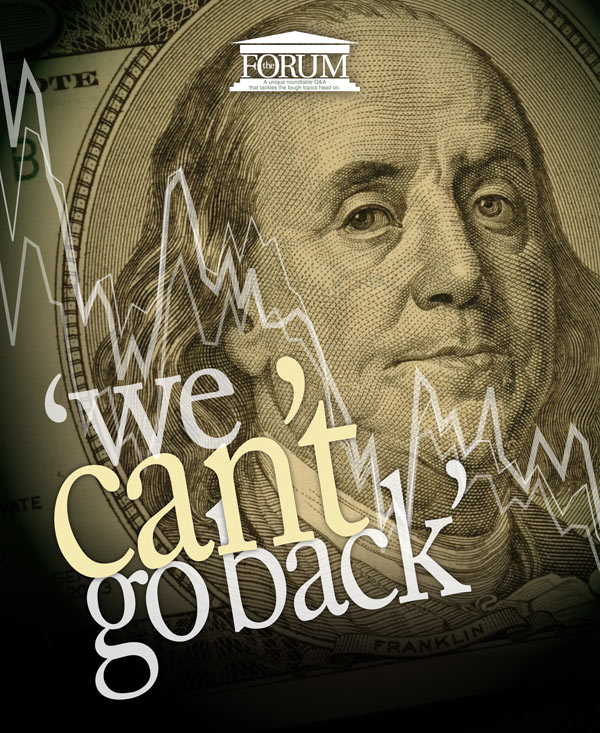
Eight of Marion County’s top business and community leaders sat down with Ocala Style for an in-depth interview concerning the state of our local economy. We discussed the Taylor, Bean & Whitaker fiasco, our extremely high unemployment rate, and if Tallahassee plans any further cuts. How will these issues affect your family? Read on.
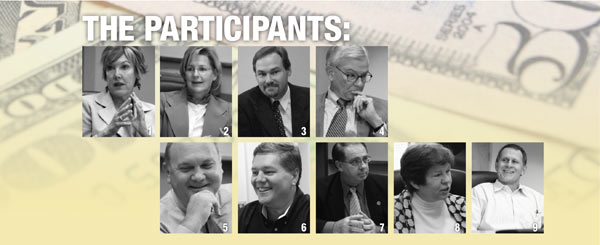
1. Jaye Baillie—Ocala/Marion County Chamber of Commerce president/CEO 2.Martha Barnwell—Ocala/Marion County Economic Development Council chair; Progress Energy Florida north coastal region vice president 3. Dean Blinkhorn—Ocala Style editor-in-chief 4. Charles “Chick” Dassance—Central Florida Community College president5. Rick Horst—Ocala city manager 6. Kurt Kelly—Florida House of Representatives member 7. Lee Niblock—Marion County administrator 8. Pat Reddish—Workforce Connection board chair; Signature Brands human resources director 9. Pete Tesch—Ocala/Marion County Economic Development Council president/CEO
We figured the best way to get the in-the-know answers was to gather a hand-picked group of Marion County’s top business leaders together and ask them a series of tough questions face to face. In a brisk, hour-long discussion in the comfortable Ocala/Marion County Economic Development Corporation (EDC) conference room on a cool autumn afternoon, Editor-In-Chief Dean Blinkhorn hosted a unique forum where the camera was clicking and the tape was rolling. Here’s what everyone had to say.
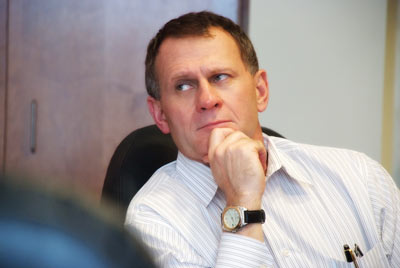
‘This Is Unprecedented’
Dean: Let’s start with the big issue—unemployment. The latest numbers put the local rate at 13.3 percent.
Pete: I don’t think it’s been that high since the early ‘70s. This is unprecedented.
Dean: What things are being done locally to try to bring that number down?
Pete: The game plan? Through Workforce Connection, stabilize the triage of our dislocated workers. Pat and the staff there have done an admirable job. The second part is, “What are we doing to help create or retain jobs?” That’s a particularly vexing situation because we have several thousands of people out of work and the economy in a very slow stage. Companies are still very hesitant to hire people or even expand, so the idea of actually investing millions of dollars of capital in hiring people, we’re not there yet.
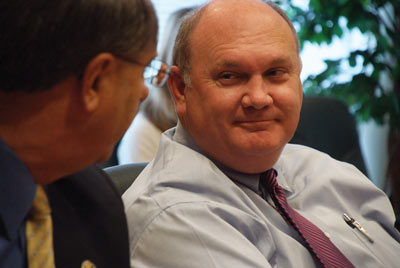
However, we’re starting to see some significant progress. There are companies in niche markets saying, “We want to hire people, even how tentative this might be,” so there are signs that the economy is getting better. But it’s going to take a long time.
We have about 17 or 18 viable projects in all different types of industry sectors, and we’ve gone to our partners—the City of Ocala, Marion County, and the State of Florida—to ask what we can do to accelerate the process. You’ll see in the next several weeks, probably right around the time this article will come out, how successful we are in attracting these companies and getting them to come and close the deal.
Dean: Jaye, I’ve noticed that you’re still attracting new members to the Chamber, which tells me that businesses feel like they need to invest in themselves. What are you seeing as companies position themselves for 2010?
Jaye: We’ve looked at innovative and expanded ways to support our small businesses—being a good partner with the EDC, the city, the county, Workforce, and CFCC—and what we can do to help our second-tier businesses that are poised and ready to go, applying the principles of economic gardening. Do they need capital? Do they need a new site? Do they need someone to return their call from city hall or the county? How can we help troubleshoot that? We’ve applied those principles a couple of times with our partners and it really is making a difference because small businesses are our engine for new job starts.
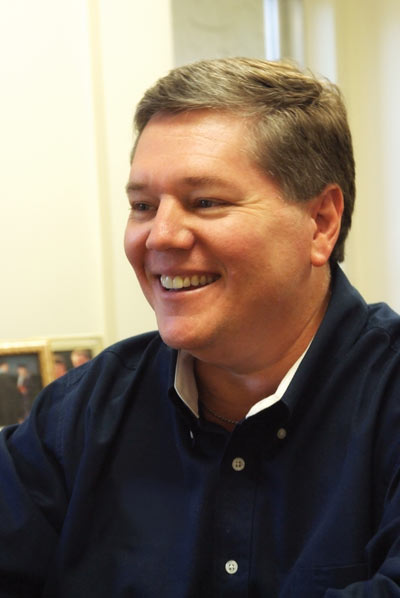
The other piece of innovation is getting our small businesses to think about new channels. We have $125 million being exported out of this community, so how do you enable our small businesses to begin to think about exporting? We’ve held a couple of seminars to show them the resources and case studies of small businesses that have been successful.
Dean: Can you give me a local example of a company that’s looking at exporting?
Jaye: We’re talking to Country Meats, a family-owned business looking at expansion, and they want to stay here. We’re putting them in the hands of the export experts who can look at their business plan and help them take it from a domestic to an international model.
‘It’s Been A Real Strain’
Dean: Chick, some locals who lost their jobs are looking at retraining and going back to school. You’ve seen some huge enrollment increases, correct?
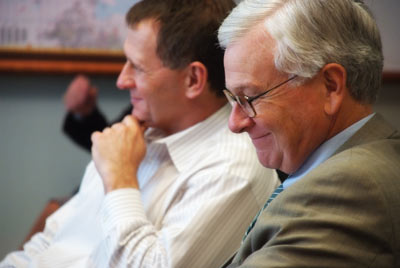
Chick: That probably started early in this process. Since Fall 2006, we’ve grown 40 percent, which is pretty phenomenal. Quite a few dislocated workers are going through some retraining through our credit programs, and there are still very good jobs in a lot of areas. Even though the demand has decreased a little bit for nurses, there is still a need.
The entire college system across the state has absorbed about 150,000 students in the last couple years. My concern—and I know it’s the concern of everybody here—is jobs at the end of that rainbow. We can’t really create those. But the Workforce Connection, the EDC, the city, the county, and the Chamber have a great history of working together, and that’s not true of every community.
Dean: Describe the past year.
Chick: Our budget’s been reduced and probably will be again, in terms of state funds. The Legislature has authorized us to raise tuition, which we’ve done, but even with that, we have about 15 percent less per student right now. It’s been a real strain.
Kurt: Our general revenue dollars—the dollars that we spend on the three major drivers: education, corrections/legal, and health care—are down about a third in about two-and-a-half years. That’s a dramatic reduction, about $9 billion.

These are very challenging times. It’s not that the Legislature or anybody says, “We don’t think this is important.” It’s just the resources really are not there. Taylor, Bean & Whitaker brought specific attention to an already-growing problem. That’s why there is this argument about jobs and our community. That’s not just 13.3 percent, but 18,500 actual people.
Dean: I’m glad you brought up Taylor, Bean & Whitaker, Kurt. In the aftermath of its sudden closure, you saw everyone working together to try to find a way to help those people as quickly as they could, but how much more can we take locally? Are we looking at another round of cuts?
Kurt: Well, the reports from Tallahassee are not necessarily good news. I just came from a briefing—I sit on the [House] Economic Development Committee—and the short-term prognosis for what we’re up against this year is about $3 billion less, not including the already encumbered stimulus dollars.
It’s a difficult time, and we’re not out of the woods, but we have some good news—tourism has stabilized. At the end of the day, we have to balance our commitments, so there will be cuts in certain areas, no doubt about it.
Chick: They just don’t have the money. It’s a tough place to be.
‘Just Ahead Of The Curve’
Dean: Right now every company is trying to do more with less. Lee, how’s the county managing?
Lee: Little did county government know back in February and March that we would be in the economic situation we’re in right now. I bet everyone at this table thought last year at this time that in March and April of 2009, things would start to turn around. Taylor, Bean & Whitaker was just another gut shot we took that was, quite frankly, unexpected until the very end.
As Kurt and Pete said, it’s all about jobs, about putting our 18,500 people back to work. Rick, as everyone knows, finished a very successful first year, and I’m two-thirds of the way through my first year. But it feels like we’ve had a career of working together because the relationship between the city and county has never been better.
Rick and I had to make some tough recommendations to our elected officials to make sure we had our fiscal house in order, so I think we’ve been just ahead of the curve on everything we’ve enacted. I owe it all to the partnership that we have at this table.
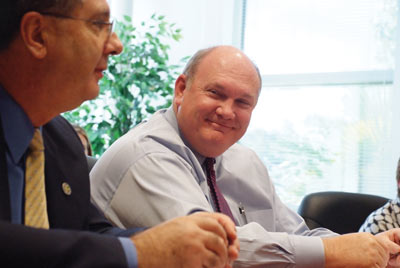
Rick: As I look at local government across the country and Florida, most are balancing their budget by raising fees and taxes or cutting positions or services. I think both at the county and the local level, although we’ve had some positions lost mostly through early retirement programs, we’ve said no to all of those. We have to live within our means as a government just like every household. When they have to tighten their belts, we have to tighten ours. We understand that.
The only thing that can make us better is the citizens. When they engage with us, we are as close to what democracy and society and community is supposed to be as we can imagine. They may gripe, they may moan, they may complain, they may feel threatened from time to time, but they’re still working, they’re still digging in and rolling up their sleeves. That propels me—and everyone around this table, I think—to work harder and push forward.
Dean: To your point, Rick, who is the ideal citizen?
Rick: Well, they’re going to have to engage. One of the things we spoke about just last night is a three-year process to solicit the input of the community so we can have a unified mission. That doesn’t mean we’re always going to agree, but we have to know where we’re going to be before we can ever figure out how to get there. I think a lot of individual parties think they know, but until we get unified as a community, I don’t think we can achieve it. Elected officials will come and go and things will change, but unless the community has sweat equity in the game, it won’t change.
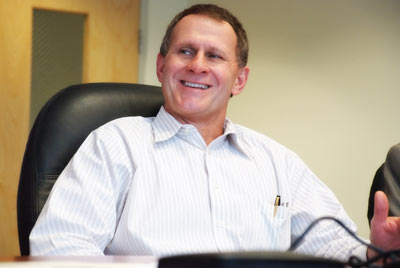
Martha: We need to continue to promote our community. When you take a look at the [EDC’s] Economic Action Team, the momentum has stayed strong. Our plan has 12 major parts to it (see sidebar), and there are probably 10 or 12 under each one of those, so every group is working together to bring jobs. I think, as Pete mentioned, we’ll see that begin to turn around here very shortly. In some ways, we already have.
‘We Have Great Natural Resources’
Dean: All of us sitting here are, in one way or another, big promoters of Ocala and Marion County. So let’s talk a little about what’s still good about Ocala.
Jaye: It’s interesting, it doesn’t matter if I’m talking to a group of citizens who have just moved into one of our retirement villages or someone who’s been here 10 or 20 years, there’s a common theme. People say that the sense of community here is palpable, that if people want to get involved they can get civically engaged. There are no barriers to being involved.
Rick: I came from a community in Utah that some would consider Utopia—beautiful, new, high income—so what attracted me to Ocala? Well, all the things that Utah didn’t have in that city. Here, someone’s always reaching out to lend a hand. Are we perfect? No. Do we have a ways to go? Yes. But the foundation is as good as it gets.
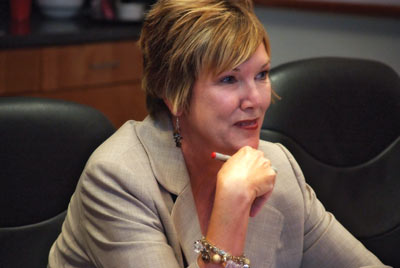
Pat: I also think there’s another part. You feel it, you know it, but you can’t articulate it. I’ve lived all over the Southeast—from Atlanta to Jackson, Mississippi—and wound up in Ocala in the ‘80s. Everyone I talked to, the large number of people that I’ve interviewed since they were laid off at Taylor, Bean & Whitaker, what they want is to stay here.
Once you get here, you don’t want to go. When my husband told me we were moving to Ocala from Atlanta, I said, “I hope you enjoy it there” [everyone laughs]. But, obviously, I came. It’s not just one thing that makes us who we are.
Rick: The synergy of being positioned where we are in the state between Gainesville and Orlando, all those things come into play. Every time we have a hurricane, we look better. We’ve had a few of our own, but the truth is people are going to invest their resources where they’re protected. And we have great natural resources.
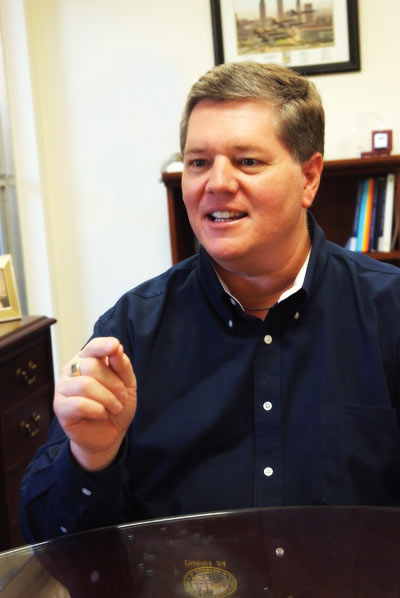
Dean: So no one thinks that after some normalcy is restored to the economy that the Ocala brand has been damaged?
Rick: I think it’s going to be better.
Martha: It’ll be strengthened.
Lee: You know, I sell Marion County every day, and we need to market it as “citrus and seasons.” You talk about the green movement? We have that color. A quarter of the county is the Ocala National Forest; we have three first-magnitude springs, five second-magnitude springs; we have quality water.
Dean: Sure, it’s just really easy to overlook what’s in your own backyard—all the springs, the bike trails, the Forest. You could go to a new place every weekend for a year and never repeat one. The best part? Most of these activities don’t cost anything at all.
Jaye: I’m in an interesting position personally and professionally because I live in the [Ocala] National Forest as my main home on the weekends and then I’m an “urban pioneer” [laughs] during the week and live downtown. We did a study with young professionals and one of the top things that they’re looking for is a vibrant downtown. Our brand is going to be even stronger when we can offer a city dwelling opportunity with lofts, condominiums, green markets, and urban walking trails.
Pat: Let me share some personal thoughts on that because my son went to school here and wanted to go away…
Jaye: I was one of those people.
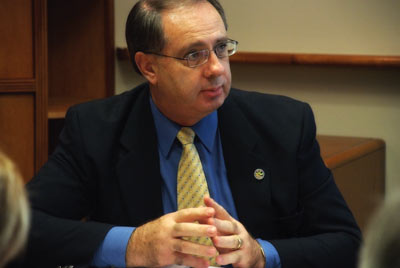
Pat: Within the last six months, I’ve hired five or six and they’ve come back because they’ve wanted to. That is a very different posture than we used to see.
Jaye: Absolutely.
Pat: We love accommodating them because this is where they want to be. We don’t have to worry about them wanting to go to a bigger place.
Dean: A lot of the ELO [Emerging Leaders Ocala] members are “boomerangs.”
Jaye: And a lot of those are graduates of Leadership Ocala/Marion Youth in the 11th grade when we showcase the economic development of the city and county.
Chick: I want to go back to Rick’s point, which is a really important one. We’re a very fiscally responsible county—I think that’s healthy—but I think we’re going to have to move sometime soon where our citizens see the value of some investment in what we can become and not consider everything that has the “T-word” [taxes] in it as necessarily bad. We’re going to have to invest in our future if we’re going to keep this future going.
‘We Can’t Expect A Return
Tomorrow’
Dean: I think that’s what this year has really been about. It’s been a reality check on what you can afford and what you want, what you’re willing to spend time and money to have. I think in Ocala, we’ve been very reliant on this expansion concept. Our once-booming housing industry covered up a lot of sins.
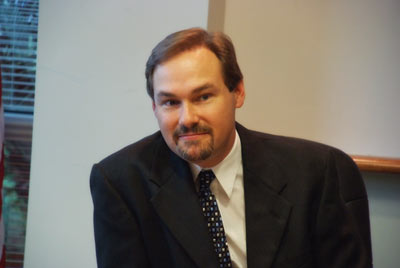
Chick: That’s right.
Lee: We all know we can’t go back to that one-legged stool of residential home development. That’s not going to work.
Rick: A community is like a human being—it has a life cycle. A community is born, goes through adolescence, and goes through its working years. And I think we’re in our working years with Ocala/Marion County right now. One of these days, when we get built out, we’re going to reach our retirement, and what do we wish for everyone? That they can enjoy retirement at the same level they did when they were working. What do we do? We make investments so that we can retire and live the lifestyle we want. This community has to do that, too.
We have to be willing to set something aside, and just like our personal retirements, it may take 50 years to realize what we need. We can’t expect a return tomorrow in everything that we do. We have to plant the seeds and then reap the harvest at some later date. If we do that correctly, we’ll find that our children and grandchildren will be much better off.
Martha: Do we have the businesses and industries that will continue to sustain this community at the level that we’ve grown accustomed to? That’s a lot of the groundwork that this particular team is doing. What’s happening here is building a foundation for our future.
Lee: I think one of the challenges has been that the city and the county are in different stages. The city is basically pretty much at build-out, and the county still has room to grow. Like Rick said, you have to save something for the future.
Dean: OK, another topic. I think we’ve seen some strong examples recently of the “reuse” concept, like IHMC [The Institute for Human & Machine Cognition] renovating our historic downtown library as opposed to building something new.
Pete: And the historic SunTrust building.
Jaye: And the historic utility building.
Lee: And the former historic Chamber of Commerce building [everyone laughs because it was recently demolished for downtown redevelopment].
Pete: Dean, I’d like to offer something that substantiates everything that’s been said here about this being such a desirable location. If you look from a demographic and economic perspective, Florida is the third largest state in the union, but if you took its economic activity from a GDP perspective, it’s like the 16th largest economy in the world.
As Lee has said in the past, Marion County is going to lead Florida out of the recession. Looking at the statistics, both the University of Florida and the University of Central Florida forecast that our economy is to grow. Not like it used to, but it’s going to grow. Our Achilles’ heel has been that in all the metro areas in Florida, Ocala is always on the bottom. Well, we’re forecast to have some of the largest percent increases in earnings, as well as per capita income, so some fuel’s there to indicate that we’re going to be positioned very strategically to accommodate future growth. It’s not going to be residential, though. It’s going to be health care and other professional services.
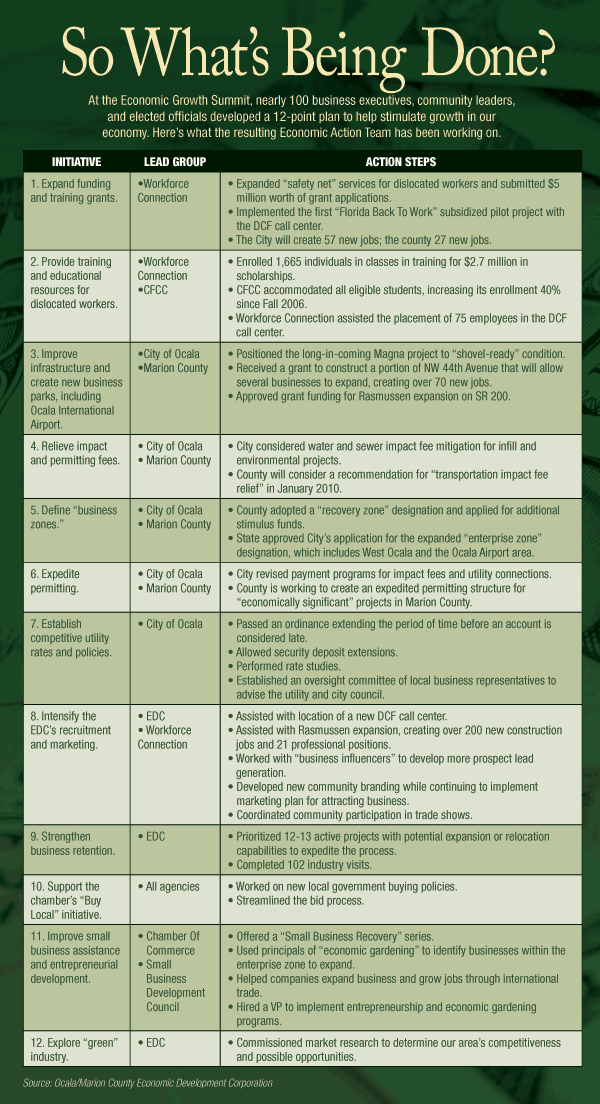
‘The Way Of The Future’
Dean: For those of us who have been here a while, we all remember when Ocala was growing so fast that new buildings would seemingly spring up on your morning commute. Maybe a little slower pace wouldn’t be such a bad thing after all.
Chick: Even if it’s between one or two percent, that’s still a lot of people.
Lee: We’re tackling our solid waste issues, our water issues, and providing leadership in that area. But one of the things we really have to do is sell Marion County. We are selling the heart of Florida, absolutely the location for people to be.
Kurt: We have some real opportunities to garner a lot of the interest and the power that is coming to North Central Florida. We’re the gateway to this high-tech corridor that’s already been developed, but our vision needs to be about where we want to be when we grow up. I like Rick’s analogy of a lifespan, and I believe that as a community we’re maturing.
Florida’s going to be on the cutting edge, and we’re working at the state level to bring these kinds of businesses to Florida. My job is to get our piece.
Martha: We’ve talked a lot about our future and our vision and why people should come, but I think we need to make sure that the citizens of Marion County know that there is a lot of action right now to put our 18,500 unemployed citizens back to work. Workforce Connection is tremendous, and Pete’s got 18 projects right now when lots of other states have greater abilities to attract them. Pete, Kurt, and folks in Washington are really working hard to make that happen.
Dean: This past year, is there one story that you would consider a touchstone, the one that’s stayed with you?
Pete: It’s a collective story. Why did Lockheed-Martin decide to put on almost 200 engineers, technicians, and other manufacturing people in their operations? Why did IHMC decide to come to Ocala and be downtown in our public library? These are essentially global companies, just a very small part of our economy, but I think that’s going to be the way of the future.
Chick: We had a young man speak at our graduation last May who was in gangs, was shot a couple of times, was paralyzed in a wheelchair, and literally turned his life around. It’s a powerful story, a symbol of what somebody can do with their life.
Kurt: I happened to be at a function out of town and ran into a guy from Ocala. He was telling me his business was getting major incentives to go to Texas. I asked him, “Would you do me a favor? Would you at least consider looking at Ocala?” and I think it’s still a possibility today. If that happens, that may be between 80 and 100 jobs. Those kind of personal engagements are critical.
Jaye: This has been a year of watching a lot of folks put their toe into starting their own small business. We ran a series of workshops all over the county for learning about opportunities for stimulus money. We expected a lot of small businesses to come—and they did—but more people said, “I’ve always thought about starting a small business. I’m ready.”
We’re following some of those people very closely and have connected them with the resources they need. We have a bank president that we all know and love [Dave Fechtman] who is reinventing himself now with a small business. To watch him go through the stages—“I’ve got the idea,” “Here’s the business plan,” “I think it’s going to work,” “This is scary!”—and seeing his early success, located in downtown Ocala… [Jaye smiles] At the end of the day, the entrepreneurial spirit is going to prevail.
‘Our Own Stimulus Package’
Dean: What about you, Lee?
Lee: I’m going to go back to what you said when we first sat down, Dean, and the times we’re in right now with 13.3 percent unemployment. Unfortunately, it’s probably going to go up for another four, five, or six months before we plateau and then come back down, but we’re going to come out of this recession stronger than ever. The history as it exists has already been written, and I think we’re now going to write the next bold chapter in the history of Marion County.
Rick: When I first got here, I told the staff, “I’m going to ask a lot of questions, and I really don’t care what the answer is so long as it’s not, ‘That’s just the way we’ve always done it.’”
Pat: It was in a meeting here [at the EDC] about putting together the call center [for the displaced TB&W employees] when we thought we could meet again and talk about it. I said, “No, we can do it quicker than that. We have people waiting.” They responded and staffed that place so quickly. It was amazing.
Dean: Tell me what’s on your agenda in 2010.
Pete: We’ll be working outside of our market to solicit companies to come here, and we’re going to be working very aggressively with our existing industry base to see what we can do to help accelerate the job creation process.
Rick: I think the more our citizens can be brought into understanding what we’re trying to do, if they exercise their right to be a citizen and quit being [just] a taxpayer, we’ll be able to move this community forward.
Kurt: We’re going to be working on the film and entertainment industry, Visit Florida [tourism], and Enterprise Florida [statewide economic development] in trying to make sure we get jobs here. Also, we’ll work on some of the unnecessary incentives.
Martha: None of us needs to be duplicating efforts. If we know the Chamber is working on something, then the EDC doesn’t have to do that part. We can all maximize the way we’re spending our time.
Pat: I think the most important thing is what Rick said about educating people to be citizens rather than just taxpayers. If we can figure out how to do that, that’ll be an accomplishment.
Jaye: We’re going to continue the efforts of the Buy Local initiative, which keeps $45 of every $100 circulating locally, and changing the city and county ordinances so that small businesses can understand the process, demystifying that. One of our small businesses attended the Buy Local procurement workshop we did with the city, county, and school board, and they bid for the new water feature that’s in front of city utility office.
The bid-off process is becoming a great savings for taxpayers and will be significant at the end of the year. It’s like our own stimulus package.






